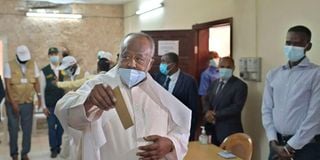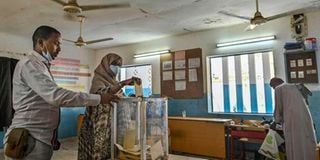Djibouti elections seen as tricky balance between democracy and stability

Djibouti's incumbent President Ismail Omar Guelleh (C) casts his ballot at the Ras-Dika district polling station in the capital Djibouti on April 9, 2021.
What you need to know:
- The landslide victory suggests that Djibouti’s partners are willing to look the other way when the vote falls short of certain principles of democracy, as long as stability is guaranteed.
Djibouti President Ismael Omar Guelleh will begin his fifth term in office after collecting the highest vote percentage since he came to power in 1999, even as various opposition groups boycotted the polls.
The vote went ahead on Friday despite rising Covid-19 cases in the country, with more than 215,000 registered voters taking part.
At 73, Guelleh is among the oldest leaders in the region, leading about one million people in the Horn of Africa nation. The region was already congratulating him by Saturday morning, after observers generally said the vote went ahead without hitches.
“President Guelleh provides Igad the leadership needed to strengthen peace and security, and deepen regional integration,” Nuur Mohamud Sheekh, spokesperson of the regional bloc, the Intergovernmental Authority on Development, told the Nation.
Mr Sheekh was part of the Igad Observer Mission in the country, whose preliminary report stated that the vote had been peaceful.
“His win is definitely a testament of the outstanding achievements of his leadership, especially in the areas of infrastructural development, and consolidation of peace in his country and the region. Djibouti is a force-contributing country to Amison, which is aimed at stabilising Somalia,” he said, referring to the African Union Mission in Somalia.

A woman exits a polling booth as she heads to cast her ballot at the Ambouli-II A polling centre in the capital Djibouti on April 9, 2021.
Huge sacrifices
The landslide victory, however, suggests that Djibouti’s partners are willing to look the other way when the vote falls short of certain principles of democracy, as long as stability is guaranteed.
“The international community likes it when Djibouti is stable and peaceful. It allows them to focus on the insecurities in the Indian Ocean and the Red sea,” said Dr Abdiwahab Sheikh Abdisamad, a Kenyan researcher on the Horn of Africa, at the South link Consultants in Nairobi.
“It is a very convenient place.”
Igad, which is headquartered in Djibouti, said it needs unity and sustainable peace and stability for the region to integrate, and President Guelleh’s continuity is seen as one way to guarantee stability.
With the smallest population in the Horn, Djibouti has remained largely stable even with troubled neighbours Somalia, Ethiopia and Yemen across the sea in the Strait of Bab el Mandeb, which sees 23 per cent of the global shipping traffic and could have hydrocarbons.
That, and its location in a busy shipping region, make it crucial, observers said.
“Djibouti is now effectively a geopolitical anomaly because of the presence of, and intense military activities by extra-regional powers in that country,” said Dr Mustafa Y Ali, chair of the Horn International Institute for Strategic Studies, in Nairobi.
He was referring to military bases set up by the US, France and Japan, as well as China, all of which are competing for Djibouti’s ear.
“With these vast geo-economic interests, human rights issues are not prioritised. They are sacrificed.”

A woman casts her ballot at the Ambouli-II A polling centre in the capital Djibouti on April 9, 2021.
Opposition calls
Exiled opposition groups under the Charter for Transitional Democracy (CTD) banner had called on the world to help “remove a dictator” and secure the country’s “independence.”
Omar Ali Hassan, once a commander of the Rapid Intervention Battalion, but who turned into a Guelleh critic, claimed the country has been run as a family affair.
“The whole system is structured to keep the President on. There is no distinction between the government institutions and the family in power. There is a lack of a proper governmental system working towards leading the country,” he said in an interview from the US, where he is exiled.
“It is definitely clear to everyone, even the President’s closest allies, that it is a rigged election, just as the previous ones were.”
CTD further said it represented the greatest coalition of communities in Djibouti with the intention of reclaiming its country.
“Facing the lack of willingness to achieve a democratic change through fair elections, and the possibility of facing fraudulent practices in future elections, we have no choice but to build a multifaceted balance of power to save the country from an irreversible collapse.”
The groups boycotted the polls, leaving only Zakaria Ismail Farah, a French dual national who announced he was renouncing his second citizenship, as Guelleh’s challenger.
CTD wanted a ‘transition’ after Guelleh’s removal.

A military officer collects his ballot cards bearing the names of the contending presidential candidates as he prepares to cast his ballot at the Ras-Dika district polling station as an electoral commission official looks on in the capital Djibouti on April 9, 2021.
Africa’s problems
Observers say Djibouti represents what ails Africa in general: lack of strong institutions to make political contenders comfortable with the results.
“It is a problem of African leadership. The question now is how long he is going to stay in power and whether he will give the young people a chance,” said Dr Ahmed Hashi, a Nairobi-based political analyst on the Horn of Africa scene, referring to the absence of term limits in Djibouti.
Under local laws, Guelleh will finish this term but may be barred by a 2010 Constitution which imposed an age limit of 75 years. But he could change the law.
“At the African Union, we have set basic standards (of democracy) which we should work towards. It is important that the opposition is heard but stability is also important. The opposition should have a chance to win elections. They should not overthrow governments of the day [through illegal means],” Hashi told the Nation.
Djibouti, a former colony of France, sits north of Somalia. During the colonial times, most of its current territory was referred to as French Somaliland and shared language, and clan connections, with neighbouring Somalia. It became formally independent from France in 1977.
But as opposed to the troubled neighbour, Djibouti has managed to keep at bay the threat of terror merchants Al-Shabaab. Djibouti, alongside Kenya, Ethiopia, Uganda and Burundi have sent troops to Amisom, to fight the terrorists.

A man searches for his name on the voters-roll displayed centrally on wooden notice boards at the Ecole Tour-Ousbo polling centre in the capital Djibouti on April 9, 2021.
Human rights
Djibouti has the highest per capita income among its immediate neighbours - at $3,500 - but hosts at least Sh250,000 people who are extremely poor. A similar number are unemployed, according to the World Bank.
Domestically, Guelleh’s administration is accused of restricting civil liberties. Press freedom watchdog, Reporters without Borders (RSF) listed Djibouti at position 176 out of 180 countries in the Press Freedom Index in 2020.
A US State Department Report on Human Rights says Djibouti’s impunity prevented cases of violations from being investigated.
It listed “significant human rights issues”, such as unlawful or arbitrary killings by government agents, arbitrary detention by government agents, harsh and life-threatening prison conditions, arbitrary or unlawful interference with privacy, unjustified arrests or prosecutions of journalists and criminal libel.
Also in the list were substantial interference with the rights of peaceful assembly and freedom of association, significant acts of corruption and violence against women and girls.




